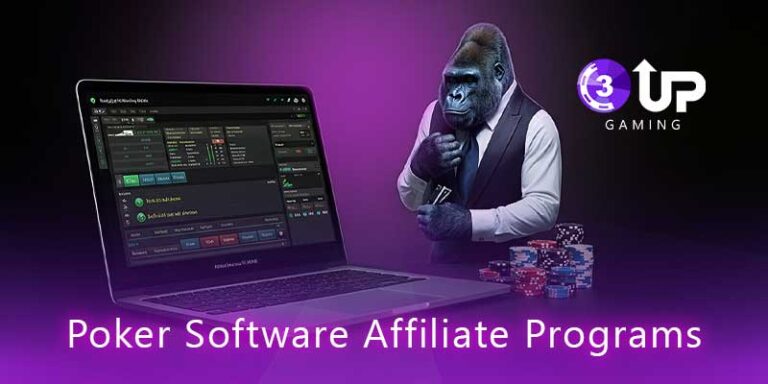Best Poker Software Affiliate Programs in 2025! Poker software affiliate programs are performance-based partnerships where affiliates promote tools and platforms designed to enhance online poker gameplay. These tools include HUDs, hand analyzers, equity calculators, solvers, and full suite solutions often marketed to serious players. Affiliates earn commissions by referring users who engage with or buy poker software through their unique links.
The core goal of these programs is to increase software adoption while rewarding marketers for their efforts. Unlike generic poker room promotions, these focus on tech-savvy audiences who seek a competitive edge via analytics and AI-driven tools. With the rise in digital poker education and solver-based strategies, these affiliate programs have carved out a high-converting, lucrative niche in the broader gambling ecosystem.
Best Poker Software Affiliate Programs in 2025
Looking to monetize your poker-related traffic in 2025? The best poker software affiliate programs this year offer generous commissions, high-converting tools, and dedicated support to help you earn passive income. These programs promote popular poker tools such as tracking software, hand analyzers, and training platforms, making them ideal for poker streamers, bloggers, and content creators.
With top brands like PokerStars, PartyPoker, and Natural8 offering revenue shares of up to 45%, affiliates can maximize their earnings while providing real value to their audience. Whether you’re targeting casual players or seasoned pros, these affiliate programs are a smart way to profit from the booming online poker market.
How Poker Software Affiliate Programs Work
These affiliate programs typically operate through a dedicated platform where users register to receive a unique tracking link. This link tracks all traffic and conversions such as purchases or subscriptions made by users sent from the affiliate’s website, blog, video content, or ads.
When a customer buys poker software or subscribes to a premium plan, the affiliate earns a commission. Some models offer one-time payments (CPA), while others offer recurring revenue based on subscription renewals. Cookie durations range from 30 to 90 days, allowing affiliates to benefit from delayed conversions.
Advanced programs provide affiliates with access to marketing materials, performance dashboards, and real-time analytics. This allows for optimized campaign management and performance tracking. The system is entirely digital and automated, ensuring affiliates focus on promotion while the software provider handles product fulfillment.
Benefits of Joining a Poker Software Affiliate Program
The most obvious benefit is the potential for consistent and scalable passive income. As many poker tools are subscription-based, affiliates can earn monthly commissions for as long as the user remains subscribed. This recurring model creates a compounding income stream that increases over time.

Another major advantage is niche specificity. Promoting poker software means targeting a highly engaged audience players already invested in improving their skills and performance. This focus leads to higher conversion rates compared to broader affiliate markets.
Additionally, poker software companies often offer generous revenue shares, frequently ranging from 25% to 40%. High ticket prices, especially in white label poker software and solvers, mean higher earnings per sale. Affiliates also gain access to beta features, exclusive promotions, and personalized affiliate support, all of which enhance promotional efficiency.
Popular Poker Software Affiliate Programs in the Market
Several top-tier poker software companies run affiliate programs with strong reputations in the market. PokerTracker and Holdem Manager, both offering HUD and database tracking tools, are among the oldest and most trusted. Their affiliate programs provide recurring revenue, extensive promotional resources, and deep brand recognition.
Hand2Note, a premium HUD and stats tool, appeals to high-stakes grinders and offers strong revenue-sharing models. GTO+, a solver tool, is another affiliate-friendly platform known for its depth and value to serious players.
Emerging tools like Flopzilla, DriveHUD, and AI-based training programs like PokerSnowie also support affiliate models, targeting both novice and experienced players. For those targeting the business side of poker, promoting white label poker software platforms offers a different affiliate angle, allowing marketers to refer operators looking to launch their own branded poker rooms.
How to Promote Poker Software as an Affiliate
Promoting poker software successfully involves credibility, clarity, and consistency. Creating detailed tutorials or review videos showcasing the software’s features in real gameplay helps drive trust and conversions. Demonstrating real use cases like leak detection or equity analysis resonates with the poker community.
SEO-optimized blog posts, software comparisons, and how-to guides attract organic traffic. Collaborating with poker coaches or influencers increases reach within communities where decision-making is influenced by authority figures.
Social platforms like Discord, Reddit, and YouTube offer real-time engagement and feedback loops. Niche email newsletters and webinars focused on strategy and optimization also serve as high-converting channels. Always emphasize the value of buying the tool as an investment, not just a cost especially when encouraging readers to buy poker software through affiliate links.
Commission Structures and Earnings Potential in Affiliate Programs
Commission models are typically structured as CPA, revenue share, or hybrid. CPA models pay a fixed amount per sale, often ranging from $20 to $100 depending on the software’s price. Revenue share programs provide a percentage of user payments, usually 20% to 40%, with some offering lifetime commissions.
Programs that offer high ticket items such as white label poker software may pay out larger CPAs per deal closed, especially when referring poker room operators or entrepreneurs. Hybrid models combine upfront bonuses with ongoing percentages, balancing immediate returns with long-term earnings.
With recurring models and subscription renewals, a well-positioned affiliate can generate four to five figures monthly from a steady base of referred users. Affiliates who dominate organic search or operate poker training platforms often scale these earnings significantly.
Read More: Game Theory Optimal Poker Software – Master GTO Strategy
How to Choose the Best Poker Software Affiliate Program
Start by analyzing the software’s market reputation. Choose programs with active user bases, regular updates, and visible developer support. A strong product ensures lower refund rates and higher customer retention, which benefits affiliates.
Check commission rates, cookie durations, and payout thresholds. Programs with 90-day cookies and low payout minimums are ideal. Evaluate the backend tools: does the program offer transparent tracking, marketing assets, and responsive support?
Compatibility with your audience is crucial. If your content focuses on beginners, complex solvers may underperform. For audiences with business intent, promoting white label poker software could yield better conversions. Finally, confirm the program is compliant with your location’s legal standards and offers secure, timely payouts.
Challenges and Risks in Poker Software Affiliate Marketing
One primary challenge is saturation. Many affiliates promote the same tools, making differentiation hard. Success requires unique angles deep dives, video demos, or exclusive strategies. Surface-level reviews rarely convert in this niche.
Another issue is maintaining updated content. Software tools evolve frequently, and outdated reviews can reduce trust. Affiliates must keep content in sync with software updates, pricing changes, and feature rollouts.

Technical complexity is another barrier. Affiliates must understand the software they promote to explain it credibly. Without proper usage, the content often lacks depth and authenticity two vital ingredients in this market.
Lastly, relying too heavily on one product or provider can be risky. If the company shuts down its affiliate program or changes its terms, your revenue could vanish. Diversifying across several software providers mitigates this risk and stabilizes income.
Legal Considerations in Poker Software Affiliate Programs
Although poker software is generally categorized as a utility tool, its proximity to gambling subjects it to certain legal frameworks. Affiliates promoting to regions with strict gambling laws must verify whether poker software falls under the same restrictions.
Complying with FTC disclosure rules is essential. Any affiliate links must be transparently identified, especially for audiences in the US, UK, and EU. Failure to disclose can lead to penalties or platform bans.
If you collect user data for example, through email opt-ins you must adhere to privacy laws like GDPR or CAN-SPAM. This means securing explicit consent and offering clear opt-out options in communications.
When promoting white label poker software, additional diligence is required. These platforms often target business operators, and the legal stakes around launching a poker site vary dramatically by jurisdiction. Affiliates should avoid implying legal consultation or guarantees.
Understanding each affiliate program’s terms of service, as well as local advertising regulations, ensures long-term, compliant monetization. Legal stability supports trust, which is fundamental for scaling in this niche.


